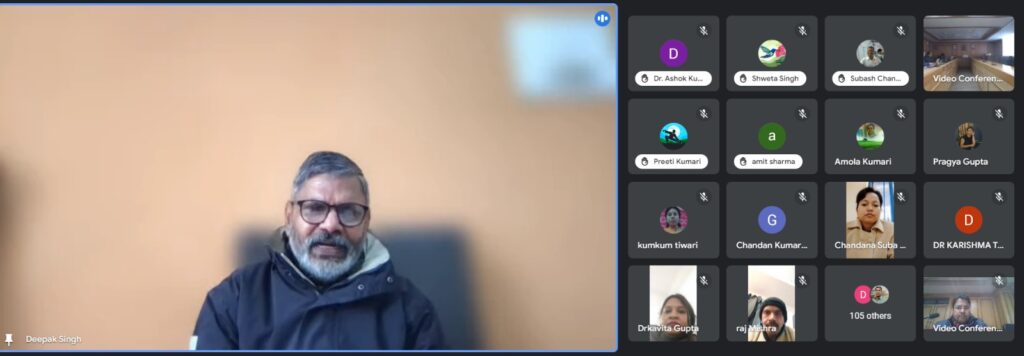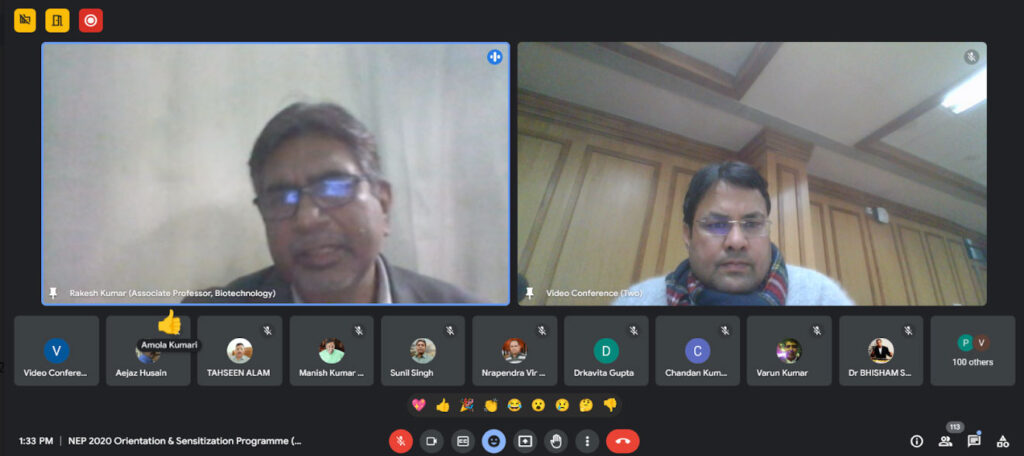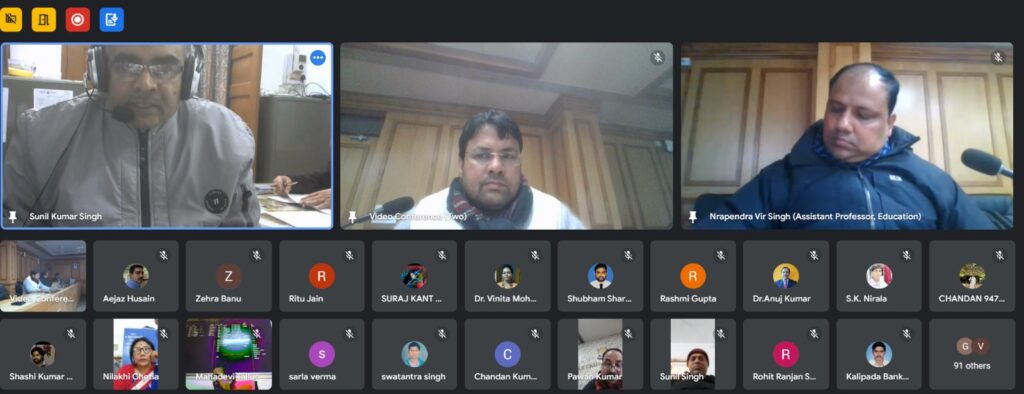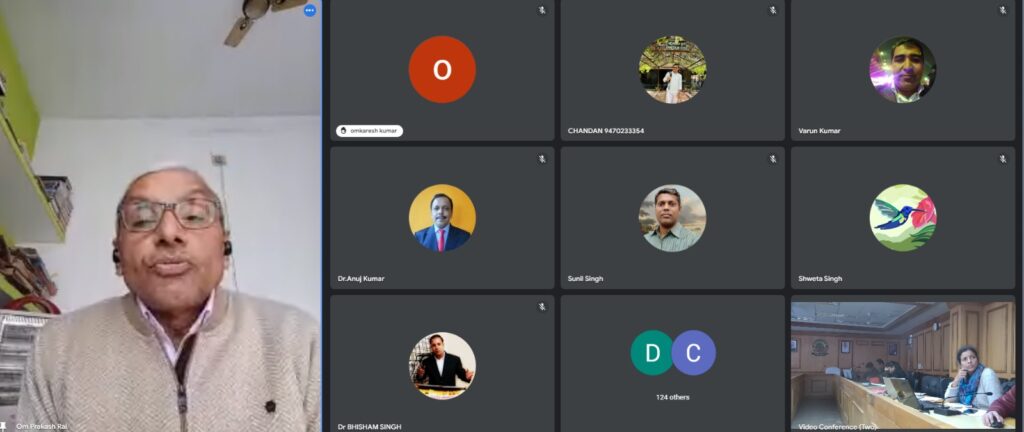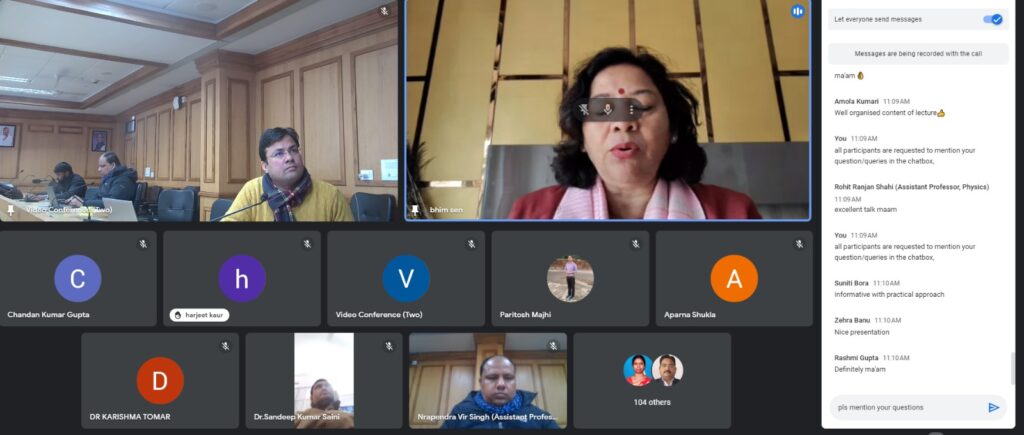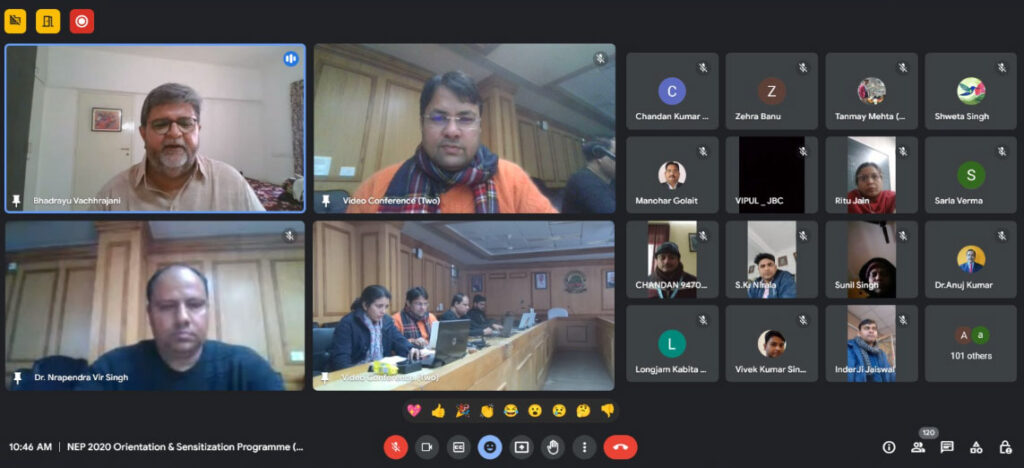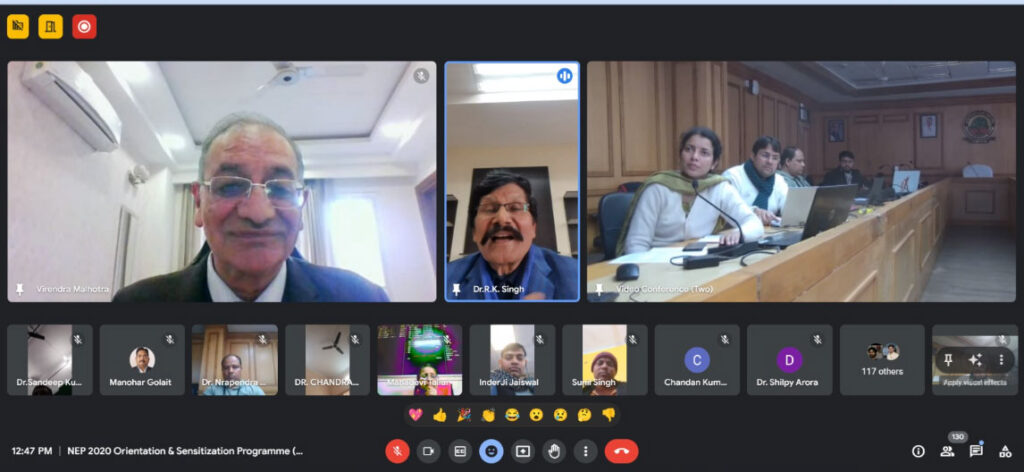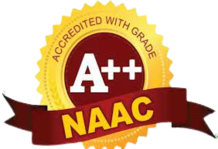The second One -Week Faculty Development Programme on “National Education Policy 2020 Orientation and Sensitization Programme” was organized by the Department of Teacher Education, School of Education, Central University of South Bihar (CUSB), Gaya under the MMTC Scheme of Ministry of Education Govt. of India from 23rd January to 31st January 2024 through online mode.
Day 1:
2nd Eight Days Faculty Development Programme on “National Education Policy 2020 Orientation and Sensitization Programme” is being organized by the Department of Teacher Education, School of Education, Central University of South Bihar (CUSB), Gaya under the MMTTC Scheme of Ministry of Education Govt. of Bharat from 23rd December to 31st December 2023 through online mode. The first day of programme began with the inaugural-cum-technical session. The session was started with saraswati vandana and university kulgeet followed by the welcome address of Prof. Ravi Kant, Head, DTE and Dean, School of Education, Central University of South Bihar, Gaya.
Professor Seema Singh, the esteemed Vice Chancellor of UP Rajarshi Tandon University, Prayagraj, graced the inaugural session as the chief guest-cum-keynote speaker, delivering an impactful presentation on National Education Policy 2020 Orientation and Sensitization. She emphasis on inclusion resonated strongly, defining it as ’embracing all,’ with a crucial call for the use of respectful language on campus. She urged educators to prioritize ‘KYL’—Know Your Learner—before addressing their educational needs.
The presidential address of the session was delivered by Professor Ravi Kant, Head of the Department of Teacher Education and Dean of the School of Education, Central University of South Bihar, Gaya in which he advocated the reciprocal flow of inclusion from the privileged to the underprivileged. He stressed the importance of recognizing individuals irrespective of gender, nationality and status and said that education can be the most powerful instrument for this.
Assistant Professor and co-coordinator of the program Dr. N.V. Singh thanked the special guests, program director, program coordinator, all the participants, faculty members, technical assistants and research students present on the virtual platform.
The keynote speaker of the second session of today’s program was Professor Rajni Ranjan Singh, Dr. Shakuntala Mishra National Rehabilitation University, Lucknow. He discussed in depth the basic aspects of National Education Policy-2020 and Bharat Centric Education and said that in reality, to make the education policy universally beneficial and all-oriented, priority will be given to the environment and systems of inclusivity at every level of education and society. Emphasis is placed on each teacher’s general knowledge and understanding of teacher education, as well as various aspects of special education, such as the need for a basic understanding of sign language and proficiency in reading Braille. He also presented meaningful data which can be helpful in understanding the real scenario of education in a better way. He said that for inclusion at every level, there is an urgent need to understand the challenges faced by students with disabilities and create educational approaches and environments tailored to their needs. Professor Singh also underlined the importance of adopting the concept of “Ek Bharat, Shreshtha Bharat” to achieve an integrated and inclusive educational environment.
The participants gained academic knowledge through active and interactive participation during both these informative sessions. Dr. Tarun Kumar Tyagi, Program Director of South Bihar Central University, Gaya, expressed vote of thanks in the second session and Program Coordinator Dr. Pragya Gupta conducted the program.
Day 2 :
The second day of the week-long “National Education Policy 2020 Orientation and Sensitization Program.The session was started with welcome address of, Dr. Tarun Kumar. The first session of the programme started through the deliberation of Professor R. K. Kumbhar (Member, NEP Task force, CUSB) who delivered an insightful discourse on the crucial subjects of financial planning and internal resource mobilization in higher education. He highlighted the significance of education in human life, discussing its extensive benefits for individual as well as society. Elaborating on the advantages and importance of financial planning, he shared a comprehensive plan for both financial planning and internal resource mobilization, elucidating their role in achieving goals of Bharat centric education in light of National Education polcy-2020. Professor Kumbhar also delved into various funding sources and recommended financial planning software. The session concluded with an engaging Question & Answer, where he addressed different queries of participants, enriching the understanding of higher education’s vital aspects.
At the end of the first session of the program, Dr. N.V Singh (Co-coordinator of programme, CUSB, Gaya) expressed gratitude to an esteemed resource person, participants, and virtual meeting attendees, including teachers and collaborators.
The second session of “National Education Policy 2020 Orientation and Sensitization Program” commenced with Prof. Pawan Kumar Sharma, Department of Political Science at CCS University Meerut, serving as the resource person. Prof. Sharma’s enlightening presentation focused on the Bhartiya Knowledge System Sources and the transition to 21st Century knowledge management. During his discourse, Prof. Sharma emphasized the significance of Kautilya and his intellectual tradition. He delved into Kautilya’s methodologies and offered insights into spiritual beginnings, shedding light on timeless principles that remain relevant in the contemporary era. Highlighting an intriguing historical context, Prof. Sharma pointed out that the term “vidya” preceded the word “siksha.” This observation added depth to the understanding of the evolution of knowledge in the Indian context. Following this, the session delved into the intricacies of the Bhartiya knowledge system, exploring diverse aspects of Darshan Sastras. Prof. Sharma provided a comprehensive overview of philosophical frameworks, including Nyaya, Vaisheshika, Samkhya, Yoga, Mimamsa, and Vedanta.
At the end of the second session of the program, Dr. Vandana Kaushik expressed gratitude to an esteemed resource person, participants, and virtual meeting attendees, including teachers and collaborators.
Day 03: The third day of program started by Dr. Tarun Kumar Tyagi by introducing the Resource Person of 5th Technical Session Professor Indu Pandey Khanduri, Head, Department of Philosophy and Director, MMTTC, HNBGCU, Uttarakhand. She highlighted the importance and usefulness of holistic education and said that the views of Jean Piaget and Field Marshal General Jean-Christine Smuts are inspiring in this context, as Discussed at the San Diego Conference on Comprehensive Education. Discussed the importance of promoting multidisciplinary, multidisciplinary, and tridisciplinary thinking and said that teachers should be skilled in the ability to develop a holistic approach. In his address, he highlighted the importance of the Panch Koshiya principle of Tritiya Upanishad related to Indian knowledge heritage and said that the purpose of this principle is to provide holistic understanding with a comprehensive intelligence to the students. Professor Indu discussed the commitment with the National Education Policy-2020 and the role of national educational bodies like UGC, ABC etc. and emphasized that there is a need for an effective mechanism in universities to ensure that students are provided with not only flexibility but also In today’s ever-changing environment, there is a need to equip teachers with the competencies and skills to understand how, what, when, and where students are to learn the educational material. According to them, an innovative approach, curriculum as well as a dynamic and attractive educational environment need to be encouraged in the institutions. At the end of the session of the program, Dr. Sunil Singh (Mithila university) expressed gratitude to an esteemed resource person, participants, and virtual meeting attendees, including teachers and collaborators
In the 7th technical session of the program, Professor Sunil Kumar Singh of the Faculty of Subject Education, Banaras Hindu University and all the participants were welcomed by Dr. NV Singh. In the second session of the “Orientation and Sensitization Program of National Education Policy 2020”, subject expert Professor Sunil Kumar Singh discussed the topic of human values, ethics and moral in higher education. In his lecture, he discussed about those human, religious, cultural, ethical and policy issues. There is an urgent need to integrate values into the curriculum and educational environment of higher education institutions. He said that we should not only give emphasis on mental development in education but there is a need to give equal importance to the best development of the heart and for this, efforts are needed not only at the institute level but also from all the stakeholders of the society and community. Cooperation is also expected. Only by engaging students in an active, interactive and inclusive environment in educational institutions can they be transformed into human capital endowed with versatile talents. Professor Singh emphasized that there is a need to know and understand the National Education Policy in the true sense, only then higher education institutions can develop knowledgeable, talented and skilled human capital as well as human value loving, rational, intellectual, creative and Will be able to develop innovative students. In his address, he also discussed the qualities required for a good educational institution and said that higher education institutions should focus on innovation, inclusiveness, and creativity for individual and social well-being. Open and distance learning opportunities have been described as important for the development of Indian youth. Professor Singh discusses in his statement the vision of a vibrant, vibrant, cultural, productive and progressive higher education system. He emphasized on the adoption of values, ethical and ethical practices in the field of education and also stressed on the need to develop a deeper understanding of it. The session was ended with vote of thanks to the Resource Person, participants and all attendees in virtual meeting by Dr Pawan Kumar, Principal, AS College, Khanna, Punjab university.
Day 04: On Day 4 in the seventh session of this program, NIOS Chairperson Professor Saroj Sharma gave a concise lecture on the topic ‘Leadership, Management and Administration in Higher Education’. He threw light on the types, need and importance of leadership in the light of the National Education Policy. He threw deep light on the principles and management of Total Quality and Sustainable Education. In the eighth session of the program, Professor Chandra Bhushan Sharma, former chairperson of Indira Gandhi National Open University and NIOS, presented a speech on the topic ‘Globalization and Internationalization of Higher Education’. He discussed the impact of globalization and internationalization of higher education on India’s education system and economy. He explained how rich countries capture the best minds of poor countries by developing new campuses and giving scholarships to poor countries which increases brain drain. He also cited examples of international education practices of ancient Indian world-class universities like Nalanda and Takshashila to understand the objective of internationalization of education, which is empowering and enlightening the people of the world through education. He also discussed how the poor quality of higher education affected the number of students going abroad to study. Finally, he attempted to draw scholars’ attention to how rich countries were colonizing the best minds of poor countries by imparting their knowledge systems.
Day 05: The 5th day and session 9th of the week-long programme started with welcome address of, Lt. Dr. Pragya Gupta. Following this, Prof. Gaurav Singh (CUET, NCERT, DELHI). An eminent figure in the realm of education, delivered an enlightening lecture on the evolving landscape of Information and Communication Technology (ICT) competencies in blended learning. Beginning with a comprehensive overview of Massive Open Online Courses (MOOCs) such as SWAYAM and edX, Professor Singh also lighted the and described SWAMPRABHA and IIT PAL learning platforms, shedding light on their significance in modern education. Addressing the current state of ICT in education, he thoughtfully navigated through the potential impact of technology on teaching, addressing the pivotal question of whether teachers will be repressed by technology. A highlight of the discourse was Professor Singh’s exploration of the dichotomy between digital native and digital immigrant teachers. He talked about the associated challenges and outlined the essential skills required for educators to navigate this dynamic landscape successfully. The discussion then delved into the policy dimensions, elucidating UGC regulations and providing insights into the National Education Policy (NEP). Professor Singh emphasized the extensive use of technology envisaged by the NEP, framing it as a forward-looking approach. Blending traditional and modern teaching methodologies, Professor Singh discussed the nuances of blended learning, including types, benefits, and challenges. The discourse expanded to cover innovative approaches such as flipped classrooms, flex modeling, and collaborative learning. Delving into the evolution of the internet – from Web 2.0 to the current Web 4.0 and the prospective Web 5.0 – the lecture provided a comprehensive understanding of the digital landscape. Notably, Professor Singh explored emerging technologies like blockchain, learning on demand, and the transformative applications of Artificial Intelligence (AI) in education. The lecture was enriched with real-world examples, making complex concepts accessible to a diverse audience. In conclusion, Professor Gaurav Singh’s lecture stands as a testament to his expertise and passion for advancing education through technology. His nuanced exploration of the digital era’s impact on teaching and learning has left a lasting impression, inspiring educators and students alike. At the end of the session of the program, Dr. Tarun Kumar Tyagi expressed gratitude to an esteemed resource person, participants, and virtual meeting attendees, including teachers and collaborators.
The ninth session of “National Education Policy 2020 Orientation and Sensitization Program” commenced with Professor Rakesh Kumar from the Department of Biotechnology at Central University of South Bihar (CUSB) delivered a compelling talk on the multifaceted aspects of research, titled “Research, Proposal, Development, Management, and Quality Publication.”. Professor Kumar underscored the paramount importance of research, prompting critical reflections on its significance within the academic landscape. Addressing the participants, he posed the fundamental question: “Why is research important?” This set the stage for an engaging exploration into the nuances of research methodology. Professor Kumar meticulously elucidated the key preparatory steps before embarking on the research proposal journey. These steps encompassed considerations such as securing funds, staying abreast of current trends, understanding processes, acknowledging limitations and restrictions, and strategically planning for the future. Delving into the practicalities of research endeavors, Professor Kumar provided valuable insights into funding agencies, organizations, and diverse funding opportunities available to researchers. His discourse illuminated the path for aspiring researchers, shedding light on the intricacies of securing financial support for their projects. The heart of the presentation unfolded as Professor Kumar meticulously dissected each essential step in the research process. From the meticulous selection of research topics to forecasting outcomes, delineating steps, and detailing methodologies, participants gained a comprehensive understanding of the meticulous journey toward impactful research. In a thoughtful conclusion to the session, Professor Kumar generously opened the floor to participants, encouraging questions and fostering an interactive dialogue. His adept responses to the queries demonstrated a commitment to nurturing a collaborative and intellectually stimulating environment
The event reached its pinnacle with Dr. Chandna Suba delivering a heartfelt vote of thanks on behalf of the attendees. Participants, too, expressed their gratitude, underscoring the value gained from Professor Rakesh Kumar’s profound insights..
Day 06: The 6th day and session 11th of the week-long programme started with welcome address of Lt. Dr. Pragya Gupta. Following this, Inspiring Educational Discourse by Renowned, Prof. O.P RAI (Former Pro Vice-Chancellor, CUSB, Gaya), Unveils Keys to Effective Teaching and Skill Acquisition, commenced an enlightening lecture with the timeless wisdom of Kabir Ke Dohe, setting a reflective tone for participants eager to delve into the art of teaching and skill development. Beginning with the establishment of clear objectives for participant interaction, Professor O P Ria delved into the essence of becoming a proficient educator. He emphasized the importance of fostering connections with learners, advocating for a collaborative approach that extends beyond the classroom. Central to his discourse was the encouragement for teachers to articulate the benefits of their classes to students, fostering an understanding of the tangible value each session offers. Professor O P Rai underscored the significance of maintaining positive relationships with students, offering guidance, and ensuring a conducive learning environment. A notable highlight was Professor O P Rai’s emphasis on the teacher’s depth of knowledge when imparting skills to students. He stressed the necessity for educators to possess comprehensive knowledge to facilitate meaningful learning experiences for their students. In the realm of effective communication, Professor shared insights on maintaining an ideal balance of speed, tone, and volume. Additionally, he highlighted the importance of encouraging students to maintain eye contact, fostering a connection that enhances the learning process. Time management and meticulous planning emerged as critical elements in Professor ‘s discourse. He provided valuable guidance on navigating the intricacies of planning and emphasized the significance of strategic time allocation for optimal results. The lecture extended into the realm of skill acquisition, where he outlined a step-by-step approach. From learning and knowledge acquisition to cultivating the right mindset and attitude, participants gained valuable insights into the holistic process of acquiring skills. A key takeaway from Professor O P Rai’s address was the promotion of a positive outlook in facing challenges. He encouraged individuals to identify their strengths and weaknesses, actively working towards self-improvement. Digital literacy emerged as a focal point, with Professor O P Rai stressing its indispensable role in the contemporary landscape. He emphasized the importance of being well-versed in technologies such as AI and blockchain. The lecture concluded with an interactive session, where participants engaged in a dialogue with Professor O P Rai, seeking further clarification and insights. His thoughtful responses reflected a commitment to nurturing an intellectually stimulating learning environment.
At the end of the session of the program, Dr. Kavita Gupta expressed gratitude to an esteemed resource person, participants, and virtual meeting attendees, including teachers and collaborators
The 12th session of “National Education Policy 2020 Orientation and Sensitization Program” commenced with Prof. M. Sen Gupta (Fulbright Scholar, Former Principal, RIE Bhopal, Former Joint Director (I/C), PSSICVE Bhopal), a distinguished academic, initiated an insightful discussion by tracing the history of vocational and skilled education in India. His discourse extended to the realm of development and vocational education within higher education, emphasizing its pivotal role in shaping a skilled workforce. Professor Gupta delved into the global landscape, highlighting the demand for skilled professionals in the age of globalization. He discussed the transformative impact of emerging technologies such as machine learning, cybersecurity, and nanotechnology on the contemporary workforce. A focal point of his discussion centered on the significance of 21st-century skills and the era of students possessing not only technical expertise but also essential interpersonal skills. Citing the National Education Policy (NEP), he emphasized the importance of students acquiring extraordinary skills to navigate the challenges of the future. Highlighting the essence of vocational education, Professor Gupta underscored its role in enhancing the quality of learners, contributing to both job acquisition and job creation. He also touched upon the importance of liberal education within this context. Addressing the modern demands of the workforce, Professor Gupta advocated for early exposure of the younger generation to skilled and vocational education. He emphasized that these types of skills are imperative for individuals entering the workforce in the contemporary era. Commending the efforts of open schools and universities on a national level, Professor Gupta acknowledged their positive contributions in providing vocational education to students. The session concluded with a dynamic Q&A session, where participants had the opportunity to seek clarification and insights.
The event reached its pinnacle with Dr. N. V Singh (programme coordinator CUSB) delivering a heartfelt vote of thanks on behalf of the attendees. Participants, too, expressed their gratitude, underscoring the value gained from Professor Rakesh Kumar’s profound insights.
Day 07: The 7th day and session 13th of the programme started with welcome address of Lt. Dr. Pragya Gupta. Prof. Bhadrayu Vachhrajani (Former VC, Lokbharati University for Rural Innovation, Gujarat and Ex-Director, ASC, Saurashtra Univ, Rajkot) commenced his lecture by delving into the rich history of the Indian knowledge system, offering insights into the National Education Policy (NEP) 2020 and distinguishing between information and knowledge. He proceeded to explore the role of education, tracing its evolution through ancient India, the colonial era, and into independent India. Highlighting India’s ascent to the third-largest education system in just 60 years, he expressed concerns about the increasing quantity of educational institutions and curriculum without a parallel rise in quality.
During the lecture, Professor Bhadrayu shared his perspectives on the Indian knowledge system, supplementing his discourse with enlightening videos featuring Sat guru, Upanishads, and Gita. Emphasizing the importance of interactive teaching techniques, he demonstrated how such methods enhance the learning experience. The session concluded with a focus on the emergence of the Indian knowledge system, or Bhartiya Gyan Parampara, and its significance for Indian society. Professor Bhadrayu engaged with participants’ questions, fostering a dynamic and insightful discussion before concluding the session.
At the end of the session of the program, Dr. Tarun Kumar Tyagi expressed gratitude to an esteemed resource person, participants, and virtual meeting attendees, including teachers and collaborators
The 14th session of “National Education Policy 2020 Orientation and Sensitization Program” commenced with Prof. Pradip Kumar Misra, Director, CPRHE, NIEPA) in a visionary lecture, explored the implications of NEP 2020 on ICT in teaching. He delved into the essence of technology, emphasizing its facets and our perception of it. The discussion extended to policies, with a focus on NEP 2020’s directives and other regulations advocating technology in education. Summing up technology in three key words—access, inclusion, quality—he elucidated NEB 2020’s recommendations for its integration into education. Throughout the lecture, Professor Pradeep actively engaged with participants, sharing insights and his personal perspective on ICT in education. Stressing the importance of staying updated on emerging technologies, he concluded the session with a thorough question-and-answer segment, addressing queries from participants and leaving a lasting impact.
The event reached its pinnacle with Dr. N. V Singh (programme coordinator CUSB) delivering a heartfelt vote of thanks on behalf of the attendees. Participants, too, expressed their gratitude, underscoring the value gained from Professor Rakesh Kumar’s profound insights.
Day 08: The valeditory session started with the welcome address by Professor Ravi Kant, Dean, Education Chair. Thereafter, Dr. Tarun Kumar Tyagi, Director, MMTTC, CUSB expressed his gratitude to the respected resource persons, participants and teachers and researchers of universities present on the virtual platform of the program and presented a brief description of the achievements of MMTTC. Thereafter, Lt. Dr. Pragya Gupta, Program Coordinator presented a brief report of the interactive sessions held on 16 subthemes of 8 NEP 2020 core themes. In the program feedback, participants said that the event provided them an opportunity to interact with the expertise, ideas and expertise of eminent experts, which would prove helpful in their professional development.
The chief guest of the program closing session was renowned educationist Professor V.K. Malhotra, Director, Food Commission, Madhya Pradesh and former Member Secretary, ICSSER, Delhi, in an interactive lecture to the participants, highlighted the nuances of research quality and established the status quo with research institutes both in India and abroad. Professor Malhotra highlighted the qualities of a successful researcher and the art of producing impactful research. The lectures extended to practical aspects, including how to approach research institutions, discussion of prevalent research problems, and the important role of continuous practice in improvement. Highlighting the importance of global collaboration, Professor Malhotra discussed about the research scenarios both in India and abroad. Offering his unique perspective, he outlines India’s strategies to compete effectively with international institutions, and concludes with a critical analysis of where India currently stands in the field of research. The session provided valuable insights and guidance, making it an important milestone in advancing the research landscape.
Professor Chandra Pal Singh Chauhan, Former Head and Dean, FOSS, AMU Aligarh delivered his lecture on Higher Education in India: Quantity, Quality and Social Relevance. He said that at present the Indian higher education system is the third largest system in the world. Therefore there is a need to increase India’s GER. He said that transformative and radical changes in higher education systems like multi-disciplinary and integrated education institutions, capacity building courses, MERU and research-intensive universities will be helpful in developing research ecosystem and quality education at every level across India.
Professor Rakesh Kumar Singh, OSD, CUSB, in his presidential address, introduced all the participants to the teaching-learning process and administrative innovative efforts of South Bihar Central University and how the university earned its academic position in the list of NAAC and other regulatory bodies. . He also mentioned in his lecture that the university, as an ideal institution for the Bihar region, provides the most accessible and best opportunities for teaching to institutions and individuals associated with all fields of education. Its effort is to provide quality education in all educational fields.
Dr. Nripendra Veer Singh, program co-coordinator, expressed heartfelt thanks to the people present on the virtual platform and the program concluded with the presentation of the national anthem.
